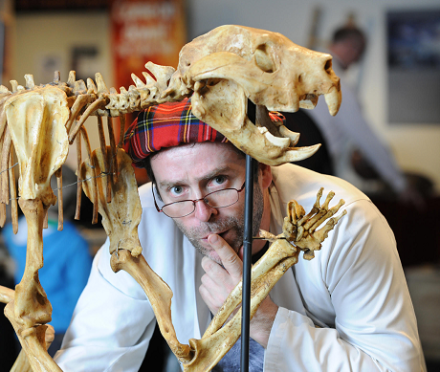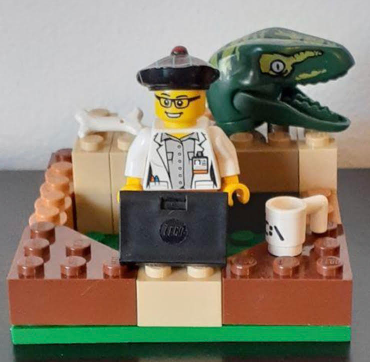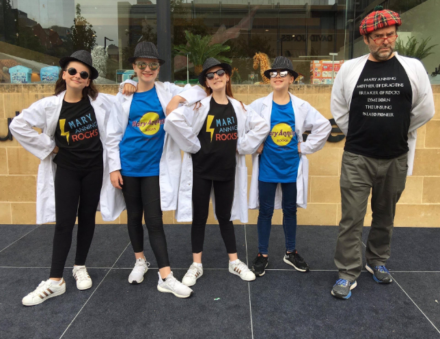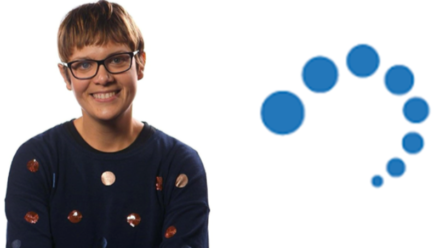Michael Mill’s alter ego: Prof Flint and a Thylacaleo:

Why did you choose to study science?
As it happens, studying science isn’t a formal thing that I’ve ever done. All of the things I’ve learnt that have led me to do all of the things I do as a writer, producer, performer and SciCommer, have come through being self-taught. I’ve learned to write songs by writing songs. I learned to perform by putting on shows and performing. In the science space, learning about/studying science has very much come by hanging out with the scientists who do the stuff. In particular… long story, written short; through a series of events early on, including Palaeontology Week at the South Australian Museum, and doing a radio show for young people, I was introduced to the work of key scientists, and to the scientists themselves. Across time, the relationships have become such that in creating a performance, or a song, for example, I’ll seek advice and the science from whoever is relevant. Indeed, the songs on the second Professor Flint album “Dinosaurs Amongst Us!” were effectively peer-reviewed to ensure content accuracy. A couple of the songs were co-written by the scientists who do the work. Professor John Long, and Dr Gilbert Price. This, I think, is a key lesson in all of SciComm for other SiCommers. If you’re not the scientist, make sure you engage with the scientist in order to ensure you get the science right. Even if you think you’re ready to publish… double-check with them. It’s their work you’re sharing. They are the finders of the story. We SciCommers are the tellers of that story.
Getting back to the original sense of the question, though… studying science, even though not in a formal way, kind of snuck up on me. As it has, I have come to better understand the delightful nature of the Universe, the unlikeliness of us, and have come to be so very grateful that I have these few years of consciousness to exist, see some of what’s out there, and do some things as part of it all.
Looking back now, what has been the best part of your career in SciComm?
The best parts will always and forever be the individual reactions from people. Much of what I do is in working with young people. In that space, there are times when you can see that you’re at a moment when a light has been switched on. The creation of that moment is not just mine. It is all of the things that others have done to lead up to then, and whatever thing it is that I’ve done, has just helped flick the switch. But of all the things, that is the thing that is by far the best. A couple of years ago, a parent sent me a photo of their 7-year-old son who had dressed up as my alter ego, Professor Flint, for Book Week. Just on a month ago, another parent sent me a photo of a LEGO professor Flint her 6-year-old had proudly made and had insisted that this was a forever model, unlike all the rest of his usual LEGO craft. We must never, ever stop understanding the importance of what we do as SciCommers, especially for young people. We must also never forget the responsibility for authenticity that goes along with it.
I guess there are plenty of other best bits too. I’ve been able to work with and help develop the skills of dozens of young performers. I’ve been able to go on real palaeontology digs and do actual digging. I’ve been able to see fossils and work that is as yet unpublished. I even got to perform at last years Society of Vertebrate Palaeontology international conference in Brisbane, to the world’s leading Palaeos. All of it remains a humbling and extraordinary set of experiences.
Where has your career led you?
The most correct answer is that it’s led me on a most delightful, occasionally extraordinary, regularly challenging, and most marvellous adventure! There was never a career plan, and there still isn’t. Choices have often been on a whim, of thinking… Oooh… I might do that… let’s see what happens if I do this… and various other random meanderings. Looking back, it looks to be a quite well-planned and thought-through career. The reality is nothing of the sort. As for what those places this adventure has led me? I guess some of those places are touched on in my previous answers. There are some quite lovely and humbling things that I’ve been able to do through writing, performing and producing, that I’d never have envisaged. As a child who wrote poems, and then started singing them, I’d hopes of music becoming my career. The idea that I’d write and perform shows at cultural institutions, and other locations… that I’d both speak and perform at conferences on science communication, storytelling, and on interpretive tours … that I’d hang out with some of Australia’s and the world’s leading palaeontologists and create songs with their help… none of this was ever close to where I thought it might lead.
As with many in the arts space, I worked in hospitality for many years. I left that just over 9 years ago, and have managed to survive in that time, largely through doing gigs of various kinds. As an unfunded sole-trader, it is the clients that have kept me going, and allowed Mexico to operate in this space full time. It is the audiences that have allowed me to keep doing this thing for all this time, and I’m always cognisant and grateful that I get to do this because of them.
Through the character Professor Flint, I’ve created a presence in Dinosaurs Down Under.
And in response to COVID19, did some rapid adapting, and have been doing a series of live sessions through Dinosaur University.
All of the things, they are done under the banner of me as Heaps Good Productions.
Prof Flint is also on Spotify. And the music is also available on iTunes and all the rest of it! All of which seems a little surreal, at times. As do those delightful moments when you see the light go on, or you’re sent something by a parent, or hear an unsolicited comment from a child of how much what you do has meant to them. It is in this latter world, though, that no matter where a journey might take you, the importance of what we do is revealed.
What excites you most about your work?
The things that excite me most are the various moments of creation… Be it the idea for a song, the instant drawing together of a disparate set of ideas into a concept, or the live moments of creation during a performance. This is different to the idea of what delights me most. As noted above, it’s the interactions with individuals that do this. What is important, though, is that in creating the work, it is never about seeking that out. In creating the work, it is about seeking to create the best piece of work it can be, and the rest will be whatever it is.
What advice do you have for anyone considering a career in SciComm?
Here’s my list of essential things:
Always remember that you are working with scientists who are passionate about the things that they do. Respect them, and their work. Good science communication begins with good science, and respect and understanding that you’re telling the stories that someone else has revealed.
Take the time to understand cognitive bias, and learning. Understand how we think and interpret the world, and how we learn. Humans do not engage with facts or data. We engage with stories. We are not the wise ape. We are the storytelling ape.
Accept that if someone isn’t getting a message you’re wanting to deliver, it’s not their problem. It’s yours! If someone doesn’t get what I’m trying to get them to understand, it’s on me, and not them, to find another way. It turns out, anti-vaxxers actually love their children. A lot! In fact, I’d suggest as much as the rest of us. They’ve been sold a dangerous narrative, and charlatans like Andrew Wakefield ought to be in prison for the deaths they have caused. And I don’t have a problem in attacking those who deliberately weave a narrative of deceit. But if you monster the parents, and dismiss them as idiots, they’ll never engage, and you’ll lose them forever. It seems to me at times that there are folk who’d rather be right than effective. Good SciComm needs to be effective. The moment Hillary Clinton referred to Trump supporters as “deplorables” is the moment I said to my friends that she would lose.
Be authentic, and if you get it wrong, fess up. Be brave and put your work out there, see how it fares in the universe, and learn from it. If something goes wrong, your first response needs to be “Challenge accepted!” It ought not be, How do I cover this up? What spin do I put on it? Keep it real, and take note of those who disagree with you. Your job is to make the final choices, but part of the way of overcoming cognitive bias is having outsiders challenge us.
Oh yeah… and don’t do it for the money! Very few projects I’ve worked on or decisions I’ve made in the last 20 years of doing this art/science/SciComm thing have had anything to do in the pursuit of dollars, as my accountant will tell you. Pick the projects that you think are going to delight you. Make the choices you believe you’ll enjoy the most. To date, it seems to have worked out okay.
What are some of the greatest challenges that you’ve overcome in your SciComm career?
Of course, with COVID19, everything changed. Within a space of a few hours, I went from a year of planned performances, including interstate tours, to nothing. A place with zero income, and no idea of what to do. At least for the first few hours, and then it was about dancing between moments of despair on the sofa, and getting into some crazy zone of finding ways to adapt, and see what I could do with the skills I have.
As of now, I reckon I’ll be okay. I’ve raided some of my Super, because, well… what do you do when you have no prospect of any income? $10k now, is worth far more to me than $10k in 10 years time. I’m also now on Job Keeper, and my view is that of course, I should be. While I understand the decisions that have been made to keep the community safe, those decisions put a halt to my income. We are at a time when we need to ensure that we don’t replace one pandemic, with another… that of mental health. I’m principally seen as a member of the arts community, though much of my work is in the science space. While not the only industry to suffer dramatically, the arts have been hugely affected. It is in the arts where the storytellers dwell. It is in the arts that people have found solace and connection thought this difficult time. It is in the arts, where we will find those best able to make sense of what we’ve been through.
So when I look at what the greatest challenges have been for me, nothing compares to what’s happening right now. Through Dinosaur University in particular though, I have been able to do some awesome things I’d not have thought of doing. I’ve done Facebook live sessions from the South Australian Museum, the Flinders University Palaeo Lab, and the Adelaide Botanic Garden. I’ve also created a Patron account for additional subscriber services. To honour the 221st birthday of palaeo pioneer, I’ve recently interviewed a dozen significant women in palaeo from Australia and around the world. So, in revisiting the questions about what excites me most, what advice to give, and where this has taken me… these last few weeks are a microcosm of all of that. Of accepting the challenge and being brave… of being adaptable… and of going wherever the adventure might take me.
Lego Flint in his Dinosaur University Office

Prof Flint and the Flintettes







